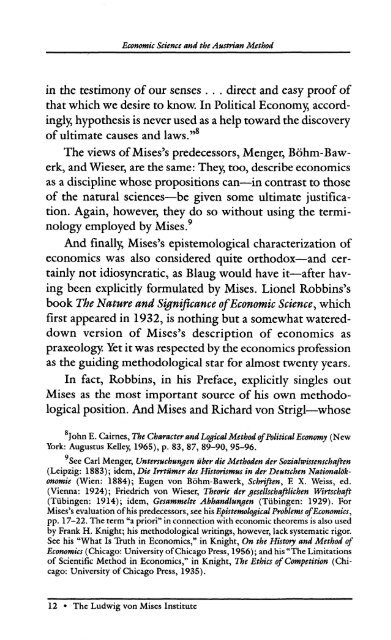Economic Science and the Austrian Method_3
Economic Science and the Austrian Method_3
Economic Science and the Austrian Method_3
- No tags were found...
You also want an ePaper? Increase the reach of your titles
YUMPU automatically turns print PDFs into web optimized ePapers that Google loves.
<strong>Economic</strong> <strong>Science</strong> <strong>and</strong> <strong>the</strong> <strong>Austrian</strong> <strong>Method</strong>in <strong>the</strong> testimony of our senses . . . direct <strong>and</strong> easy proofofthat which we desire to know: In Political Econom~ accordingl~hypo<strong>the</strong>sis is never used as a help toward <strong>the</strong> discoveryofultimate causes <strong>and</strong> laws."sThe views ofMises's predecessors, Menger, Bohm-Bawerk,<strong>and</strong> Wieser, are <strong>the</strong> same: The~ too, describe economicsas a discipline whose propositions can-in contrast to thoseof <strong>the</strong> natural sciences-be given some ultimate justification.Again, however, <strong>the</strong>y do so without using <strong>the</strong> terminologyemployed by Mises. 9And finall~ Mises's epistemological characterization ofeconomics was also considered quite orthodox-<strong>and</strong> certainlynot idiosyncratic, as Blaug would have it-after havingbeen explicitly formulated by Mises. Lionel Robbins'sbook The Nature <strong>and</strong> Significance of<strong>Economic</strong> <strong>Science</strong>, whichfirst appeared in 1932, is nothing but a somewhat watereddownversion of Mises's description of economics aspraxeolo~ Yet itwas respected by <strong>the</strong> economics professionas <strong>the</strong> guiding methodological star for almost twenty years.In fact, Robbins, in his Preface, explicitly singles outMises as <strong>the</strong> most important source of his own methodologicalposition. And Mises <strong>and</strong> Richard von Strigl-whose8John E. Cairnes, The Character <strong>and</strong> Logical <strong>Method</strong> ofPolitical Economy (NewYork: Augustus Kelley, 1965), p. 83,87, 89-90,95-96.9See Carl Menger, Untersuchungen uber die <strong>Method</strong>en der Sozialwissenschaften(Leipzig: 1883); idem, Die Irrtumer des Historismus in der Deutschen Nationalokonomie(Wien: 1884); Eugen von Bohm-Bawerk, Schriften, E X. Weiss, ed.(Vienna: 1924); Friedrich von Wieser, Theme der gesellschaftlichen Wirtschaft(Tiibingen: 1914); idem, Gesammelte Abh<strong>and</strong>lungen (Tiibingen: 1929). ForMises's evaluation ofhis predecessors, see his Epistemological Problems of<strong>Economic</strong>s,pp. 17-22. The term "a priori" in connection with economic <strong>the</strong>orems is also usedby Frank H. Knight; his methodological writings, however, lack systematic rigor.See his "What Is Truth in <strong>Economic</strong>s," in Knight, On <strong>the</strong> History <strong>and</strong> <strong>Method</strong> of<strong>Economic</strong>s (Chicago: University ofChicago Press, 1956); <strong>and</strong> his "The Limitationsof Scientific <strong>Method</strong> in <strong>Economic</strong>s," in Knight, The Ethics ofCompetition (Chicago:University of Chicago Press, 1935).12 • The Ludwig von Mises Institute


